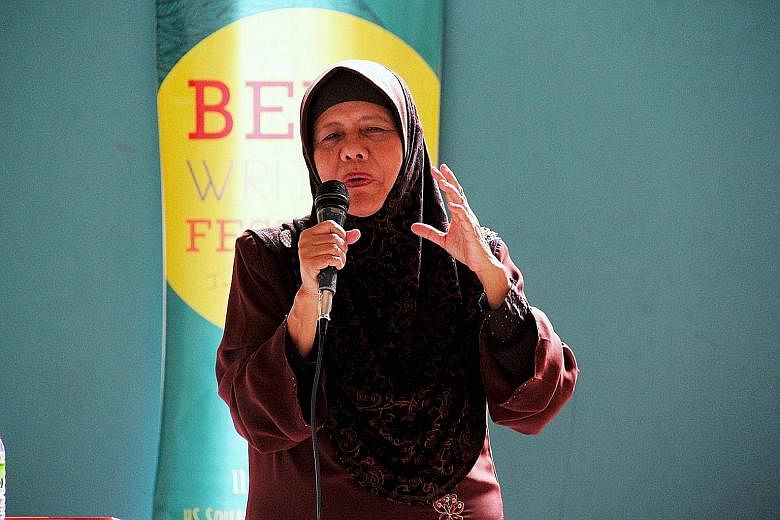Growing up in a village, Malaysian poet Zurinah Hassan was told she should be seen, not heard.
When she wanted to read, she was told instead to cook rice.
More than half a century later, in 2015, she became the first woman to be conferred the Sasterawan Negara literary award, making her Malaysia's first female poet laureate.
The 69-year-old, who goes by the pen name Haniruz, says this was not exactly a surprise as her name had been in contention as early as the 1990s, although the award went to 12 men before her.
Still, she was delighted to make history. "It gives me much encouragement to go on," she says in an e-mail interview. "At the same time, I fear that I am not doing enough to carry the title."
That is why, she says, she is happy to be invited to the Singapore Writers Festival this weekend, where she will take part in panels with local Malay-language writers Aidli Mosbit, Hamed Ismail and Singapore Literature Prize-winner Farihan Bahron. "It is something I should do to promote Malaysian literature."
-
BOOK IT / BOUNDARIES, LINES AND BORDERS: UNDERSTANDING THE CONCEPT OF "BOUNDARIES" IN MALAY POETRY
-
WHERE: Screening Room, The Arts House, 1 Old Parliament Lane
WHEN: Saturday, noon
ADMISSION: Festival pass event, $25
-
PANEL DISCUSSION: OUR WORDS: A REPETITION
-
WHERE: Screening Room, The Arts House
WHEN: Sunday, 5pm
ADMISSION: Festival pass event, $25
• These sessions are in Malay. Go to www.singaporewritersfestival.com
The author of 22 books - "not much," she demurs, "considering that I am almost 70" - began writing when she was 12 years old.
She was raised in a remote village in Kedah by her aunt and grandparents. Her father died when she was six months old and her mother, a nurse, was too busy to care for her.
There was no electricity in the village, let alone a library. Forbidden to go out, she sat in the house listening to the radio. The songs it played used pantuns (traditional Malay poems) in their lyrics. "This is how I fell in love with beautiful words," she says.
She became a writer because she was not allowed to speak.
"I was brought up to think that a girl should not talk a lot. My freedom for oral expression was limited. So the only other thing to do was to write down what I felt."
As a girl, she wrote about her love of her family and village. When she grew older, she began to write more about the social issues, particularly poverty, that she saw around her.
She draws a great deal from folktales and legends in texts such as the Hikayat Hang Tuah and the Sejarah Melayu. In one of her poems, she puts a feminist reading on the legend of the princess of Mount Ledang, to whom Sultan Mahmud proposes marriage.
The princess responds by setting impossible conditions for her dowry, such as building bridges of gold and silver and bringing her seven trays of the hearts of mosquitoes.
"The princess was the first woman to succeed in showing the Sultan that he, too, must accept rejection," Zurinah writes in an English translation of her poem. "It is the exertion of a woman's right to decide and take control of herself and her life."
She has five children with her husband Mohamed Saaid Abdul Manap, who is retired and previously worked for postal service Pos Malaysia.
When her children were young, taking care of them almost derailed her writing, she says. "It is difficult and can make you desperate."
She does not think being the poet laureate has changed her life greatly beyond getting saluted at ceremonies, better hotel accommodation and flying business class. "Whatever problems you faced in the process of writing will be the same."
The Malaysia she writes about today is an unpredictable one, especially after this year's shock general election when the ruling party was toppled, resulting in the first regime change since the country's independence.
"Malaysia is full of shocks and surprises, so much so nothing surprises you anymore," she says. "I can only hope and pray for better things to come, especially for the future generations."
She hopes that Malaysian literature can be devoted towards strengthening a national identity.
"We allow diversity, but all races must be aware that they are rakyat Malaysia (citizens of Malaysia) and should identify as such."


